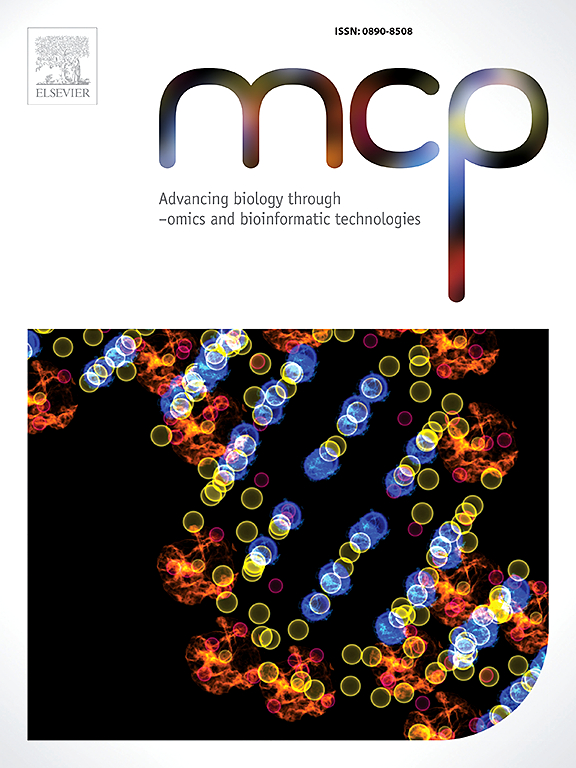METTL14 介导的 m6A 修饰上调了 SOCS3 的表达,通过调节 JAK2/STAT3 通路缓解了甲状腺癌的进展。
IF 2.3
3区 生物学
Q3 BIOCHEMICAL RESEARCH METHODS
引用次数: 0
摘要
甲状腺癌(TC)是头颈部最常见的恶性肿瘤。作为mRNA中常见的表观遗传修饰,N6-甲基腺苷(m6A)修饰在癌症的生物学过程中发挥着关键作用。然而,m6A甲基转移酶甲基转移酶样14(METTL14)介导的m6A修饰及其在TC中的潜在调控机制尚未完全阐明。在我们的研究中,我们观察到 METTL14 在 TC 组织和细胞中减少。METTL14的上调可诱导细胞凋亡,阻碍细胞增殖、上皮间质转化(EMT)以及体外和体内的肿瘤生长。从机制上讲,METTL14通过m6A甲基化修饰增加了细胞因子信号转导抑制因子3(SOCS3)的表达,而敲除SOCS3逆转了过表达METTL14对TC肿瘤发生的抑制作用。此外,METTL14介导的SOCS3的m6A修饰使janus激酶2(JAK2)-信号转导和激活剂转录3(STAT3)通路失活,在METTL14过表达的TC细胞中,沉默SOCS3诱导的细胞增殖、EMT上调和细胞凋亡抑制被JAK2/STAT3抑制剂AG490和WP1066逆转。综上所述,METTL14/m6A/SOCS3/ JAK2/STAT3轴在TC的进展中起着重要作用。本文章由计算机程序翻译,如有差异,请以英文原文为准。
METTL14-mediated m6A modification upregulated SOCS3 expression alleviates thyroid cancer progression by regulating the JAK2/STAT3 pathway
Thyroid cancer (TC) is the most common malignant tumor of the head and neck. As a common epigenetic modification in mRNAs, N6-methyladenosine (m6A) modification plays critical roles in biological process of cancers. However, m6A methyltransferase methyltransferase-like 14 (METTL14)-mediated m6A modification and its potential regulatory mechanisms in TC are not fully elucidated. In our study, we observed that METTL14 was decreased in TC tissues and cells. And upregulation of METTL14 induced apoptotic cell death and hampered cell proliferation, epithelial mesenchymal transition (EMT) and tumor growth in vitro and in vivo. Mechanistically, METTL14 increased the expression of suppressor of cytokine signaling 3 (SOCS3) through m6A methylation modification, and knockdown of SOCS3 reversed the inhibitory effect of overexpressing METTL14 on TC tumorigenesis. In addition, METTL14-mediated m6A modification of SOCS3 inactivated the janus kinase 2 (JAK2)-signal transducer and activator of transcription 3 (STAT3) pathway, and in the METTL14-overexpressing TC cells, silencing SOCS3-induced upregulation of cell proliferation, EMT and suppression of apoptosis was reversed by JAK2/STAT3 inhibitor AG490 and WP1066. Together, we indicated that METTL14/m6A/SOCS3/JAK2/STAT3 axis play an important role in the progression of TC.
求助全文
通过发布文献求助,成功后即可免费获取论文全文。
去求助
来源期刊

Molecular and Cellular Probes
生物-生化研究方法
CiteScore
6.80
自引率
0.00%
发文量
52
审稿时长
16 days
期刊介绍:
MCP - Advancing biology through–omics and bioinformatic technologies wants to capture outcomes from the current revolution in molecular technologies and sciences. The journal has broadened its scope and embraces any high quality research papers, reviews and opinions in areas including, but not limited to, molecular biology, cell biology, biochemistry, immunology, physiology, epidemiology, ecology, virology, microbiology, parasitology, genetics, evolutionary biology, genomics (including metagenomics), bioinformatics, proteomics, metabolomics, glycomics, and lipidomics. Submissions with a technology-driven focus on understanding normal biological or disease processes as well as conceptual advances and paradigm shifts are particularly encouraged. The Editors welcome fundamental or applied research areas; pre-submission enquiries about advanced draft manuscripts are welcomed. Top quality research and manuscripts will be fast-tracked.
 求助内容:
求助内容: 应助结果提醒方式:
应助结果提醒方式:


